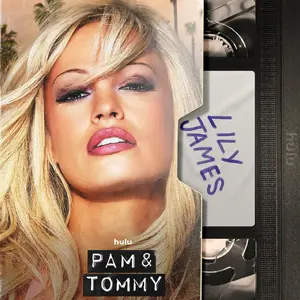Does Pam & Tommy signal the end of TV's 1990s revisionism trend?
-

The trend to revisit and reassess the 1990s kicked off in 2016 with FX's The People v. O.J. Simpson: American Crime Story followed months later by ESPN's eight-hour documentary O.J.: Made in America. "In the half-decade since, the coincidence that brought both projects to air at around the same time has evolved into a more widely applicable playbook," says Alison Herman. "Beginning with the Simpson shows, pop culture at large transformed into a revolving door of public figures misconstrued by the mass media of a quarter-century prior, many of them women. (The two most sympathetic figures in the current understanding of Simpson’s case are Nicole Brown Simpson and ex-prosecutor Marcia Clark.) It’s a trend that spans media, encompassing feature films, docuseries, scripted shows, and podcasts. Subjects of this group portrait now include Lorena Bobbitt (Lorena), Monica Lewinsky (Impeachment: American Crime Story), Tonya Harding (I, Tonya), Tammy Faye Bakker (The Eyes of Tammy Faye), and Princess Diana (Spencer, the fourth and fifth seasons of The Crown). One could even argue that Yellowjackets, the Showtime drama that stars former ingenues like Christina Ricci as the haunted survivors of a ’90s plane crash, is a more metaphorical exercise in the same underlying approach." As Herman points out, Pamela Anderson and Tommy Lee's stolen sextape is "a prime candidate for the 'hindsight is 20/20' treatment—or more precisely, Anderson is. A blond bombshell with breast implants who rose to fame as a model for Playboy, Anderson was widely mocked as a sex-obsessed airhead both before and after the tape’s release. (In an echo of the Simpson bonanza of 2016, Pam & Tommy arrives close on the heels of Secrets of Playboy, an A&E docuseries that takes a critical look at the legacy of Hugh Hefner and his publication.)" But Pam & Tommy borrows heavily from its 1990s revisionist predecessors -- especially with I, Tonya director Craig Gillespie helming the first three episodes and D.V. DeVincentis, who wrote The People v. O.J. Simpson's Marcia Clark episode, as showrunner. As a result, Pam & Tommy ends up feeling redundant. "The show makes the same arguments as countless other ’90s-set projects, and rarely as well," says Herman. "Anderson rightly tells Lee the sex tape scandal will be far worse for her—“BECAUSE I’M A WOMAN,” she screams, the subgenre’s de facto slogan. Pam & Tommy’s struggles suggest we may be running out of high-profile tabloid stories to revisit, and that the cottage industry of said revisitations may be low on creative juice. The show’s heart lies with Anderson, but in spirit it may be closer to aging rocker Lee, struggling to admit his time at the center of culture has already come and gone."
ALSO:
- Pam & Tommy would've been better off just stating the truth: "They wanted to tell (Pamela) Anderson’s story because it’s a good story, and its revelations have deeply informed the mess of celebrity and internet culture that we wallow in today," says Sophie Gilbert. "Even the fact that she resisted participating in the show is telling: What Anderson wants for herself has always mattered less than the desires she incites in others." Gilbert adds: "For Anderson, maybe the fact that she’s less a person in the show than a collection of tropes and stories animated into a whole is some consolation. But I doubt it. The more we rely on these narratives of ’90s revisionism to confront the flaws in our own past thinking, the more responsibility we have to wonder who’s being served in the process. Is it right to take a painful invasion of privacy that was turned into mass entertainment and turn it into mass entertainment again, even if the motivations have changed? Have they changed? I enjoyed this show. It made me think about Anderson differently—as someone who’s survived extraordinary victimization and typecasting and who’s managed to redefine how she’s perceived. (Whether steadfast defender of Julian Assange trumps Baywatch babe depends on your worldview, I guess.) But the series, which so often feels like it’s trying to atone for our old mistakes, seems intent on pointing out ethical transgressions while looking right past the notable void at its own core."
- Pam & Tommy misses the mark in capturing the couple’s dizzying, tumultuous and abusive relationship: "Only toward the end of the series does it begin to hint at darker issues brewing beneath the surface, as reports of Lee’s alleged controlling tendencies and heavy drinking began to emerge. Things ultimately spiraled out of control when Anderson reached her breaking point in February 1998, filing for divorce and pressing charges against Lee for hitting her while she was holding their two-month-old son Dylan," says Cheyenne Roundtree. "Over the years, the couple did try to patch things up numerous times, not only for the sake of their sons Brandon and Dylan, but because each has gushed to various outlets about how they seemed to be soulmates, describing themselves as star-crossed lovers who can’t help but return to each other. But by never really addressing the aftermath of the tape and the couple’s rollercoaster relationship, it can be easy to romanticize the glamorized TV version of their romance, especially with the show’s catchy tagline: 'The greatest love story ever sold.'"
TOPICS: Pam & Tommy, Hulu, The Crown, Impeachment: American Crime Story, Lorena, O.J.: Made in America, The People v. O.J. Simpson: American Crime Story, Yellowjackets, Pamela Anderson, Tommy Lee
